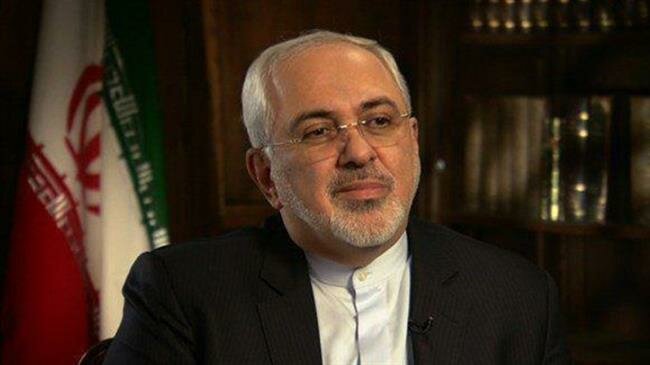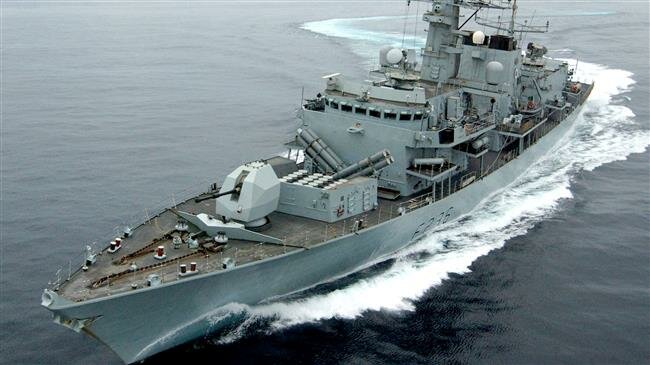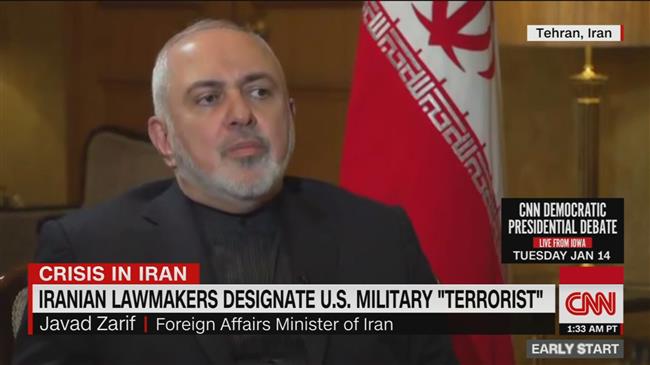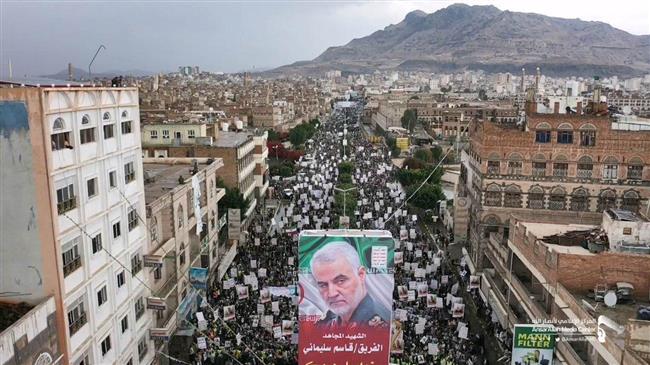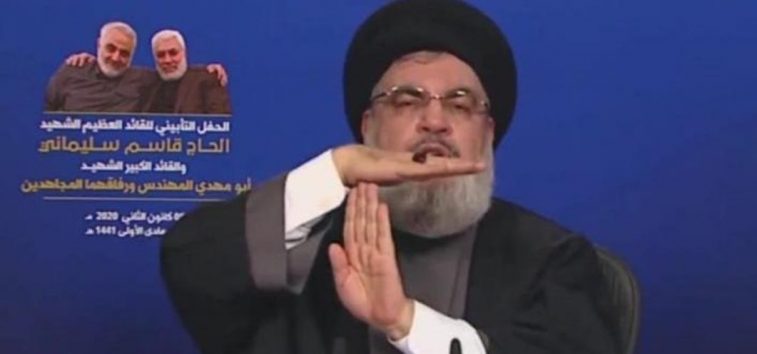Amid heightening tensions in the Persian Gulf, Iranian Foreign Minister Mohammad Javad Zarif has slammed Washington’s global presence as a cause of “insecurity and instability”.
Publish dateSaturday 20 July 2019 - 23:33
Story Code : 188691
“The United States creates insecurity and instability wherever it sets foot. Today, US presence creates insecurity in the Persian Gulf, the Middle East, in Latin and South America,” Zarif said upon arriving in the Venezuelan capital of Caracas on Saturday.
The minister will attend a ministerial meeting for the Non-Aligned Movement (NAM) in the country before travelling to Nicaragua and Bolivia for bilateral meetings.
Speaking in Caracas, Zarif said that he “doesn’t know of a place in the world where the presence of the US has contributed to stability.”
“Wherever they have gone, they have led to increased pressure on the [region’s] population and to increases extremism and terrorism,” he added.
Amid Washington’s announced campaign of “maximum pressure” against Tehran, the US presence in the region, specifically the Persian Gulf, has led to a jump in tensions in the region.
A week after the US announced additional troop deployments to the Persian Gulf in early May, four oil tankers were sabotaged in the UAE sea-port of Fujairah.
In early June, two other oil tankers were damaged by explosions in the Gulf of Oman. Later that month, Iran shot down a multi-million dollar US spy drone last week after it violated its airspace.
On Thursday, US President Donald Trump claimed that an Iranian drone had been “immediately destroyed” after flying within 900 meters of a US Navy ship.
Iran’s Islamic Revolution Guards Corps (IRGC) later dismissed the claim, publishing footage contradicting Washington’s account.
Following Iran’s apprehension of a British oil tanker due to international maritime regulation violations on Friday, Trump commented on the developments saying that Iran is "nothing but trouble".
'We always respond'
Speaking with the American New Yorker magazine in New York earlier this week, Zarif addressed the recent American provocations, vowing that Iran will “always respond”, warning Washington to “not play with Iran.”
“We say, ‘You may start a war, but you won’t be the ones who end it,’” Zarif said, adding that “We will survive; we will prosper, long after President Trump is gone.”
Tensions have mounted since the US withdrew from the multilateral 2015 nuclear deal last May and imposed unilateral sanctions both on Tehran and the countries that do business with it.
Iran has recently suspended some of its nuclear deal commitments in order to push the remaining signatories to uphold the deal and protect it from Washington’s unilateral measures.
In a further provocation, US National Security Adviser John Bolton recently claimed that Iran was prohibited from carrying out uranium enrichment.
Secretary of Iran's Supreme National Security Council (SNSC) Ali Shamkhani on Saturday dismissed the claim, saying peaceful uranium enrichment is a right for all signatories of the Non-Proliferation Treaty (NPT).
“The remarks made by the US national security adviser, in which he denied Iran’s right to enrich uranium, are a symbol of the non-commitment, unilateralism and ignorance of all international norms [by US officials] and lack any legal value or credibility,” Shamkhani said.
Meanwhile, Iran's Foreign Ministry spokesman Abbas Mousavi told the Arabic-language newspaper al-Akhbar that the Trump Administration’s offers for "re-negotiation" of the nuclear deal are nothing but a “tactic” to further increase pressure on Iran.
“We have previously experienced a multilateral deal with the Americans. It was Iran which was committed to the deal and it was the Americans who weren’t and left the agreement,” he said.
The minister will attend a ministerial meeting for the Non-Aligned Movement (NAM) in the country before travelling to Nicaragua and Bolivia for bilateral meetings.
Speaking in Caracas, Zarif said that he “doesn’t know of a place in the world where the presence of the US has contributed to stability.”
“Wherever they have gone, they have led to increased pressure on the [region’s] population and to increases extremism and terrorism,” he added.
Amid Washington’s announced campaign of “maximum pressure” against Tehran, the US presence in the region, specifically the Persian Gulf, has led to a jump in tensions in the region.
A week after the US announced additional troop deployments to the Persian Gulf in early May, four oil tankers were sabotaged in the UAE sea-port of Fujairah.
In early June, two other oil tankers were damaged by explosions in the Gulf of Oman. Later that month, Iran shot down a multi-million dollar US spy drone last week after it violated its airspace.
On Thursday, US President Donald Trump claimed that an Iranian drone had been “immediately destroyed” after flying within 900 meters of a US Navy ship.
Iran’s Islamic Revolution Guards Corps (IRGC) later dismissed the claim, publishing footage contradicting Washington’s account.
Following Iran’s apprehension of a British oil tanker due to international maritime regulation violations on Friday, Trump commented on the developments saying that Iran is "nothing but trouble".
'We always respond'
Speaking with the American New Yorker magazine in New York earlier this week, Zarif addressed the recent American provocations, vowing that Iran will “always respond”, warning Washington to “not play with Iran.”
“We say, ‘You may start a war, but you won’t be the ones who end it,’” Zarif said, adding that “We will survive; we will prosper, long after President Trump is gone.”
Tensions have mounted since the US withdrew from the multilateral 2015 nuclear deal last May and imposed unilateral sanctions both on Tehran and the countries that do business with it.
Iran has recently suspended some of its nuclear deal commitments in order to push the remaining signatories to uphold the deal and protect it from Washington’s unilateral measures.
In a further provocation, US National Security Adviser John Bolton recently claimed that Iran was prohibited from carrying out uranium enrichment.
Secretary of Iran's Supreme National Security Council (SNSC) Ali Shamkhani on Saturday dismissed the claim, saying peaceful uranium enrichment is a right for all signatories of the Non-Proliferation Treaty (NPT).
“The remarks made by the US national security adviser, in which he denied Iran’s right to enrich uranium, are a symbol of the non-commitment, unilateralism and ignorance of all international norms [by US officials] and lack any legal value or credibility,” Shamkhani said.
Meanwhile, Iran's Foreign Ministry spokesman Abbas Mousavi told the Arabic-language newspaper al-Akhbar that the Trump Administration’s offers for "re-negotiation" of the nuclear deal are nothing but a “tactic” to further increase pressure on Iran.
“We have previously experienced a multilateral deal with the Americans. It was Iran which was committed to the deal and it was the Americans who weren’t and left the agreement,” he said.
avapress.net/vdcco4qss2bq4e8.-ya2.html
Tags
Top hits
